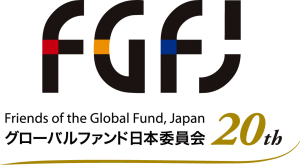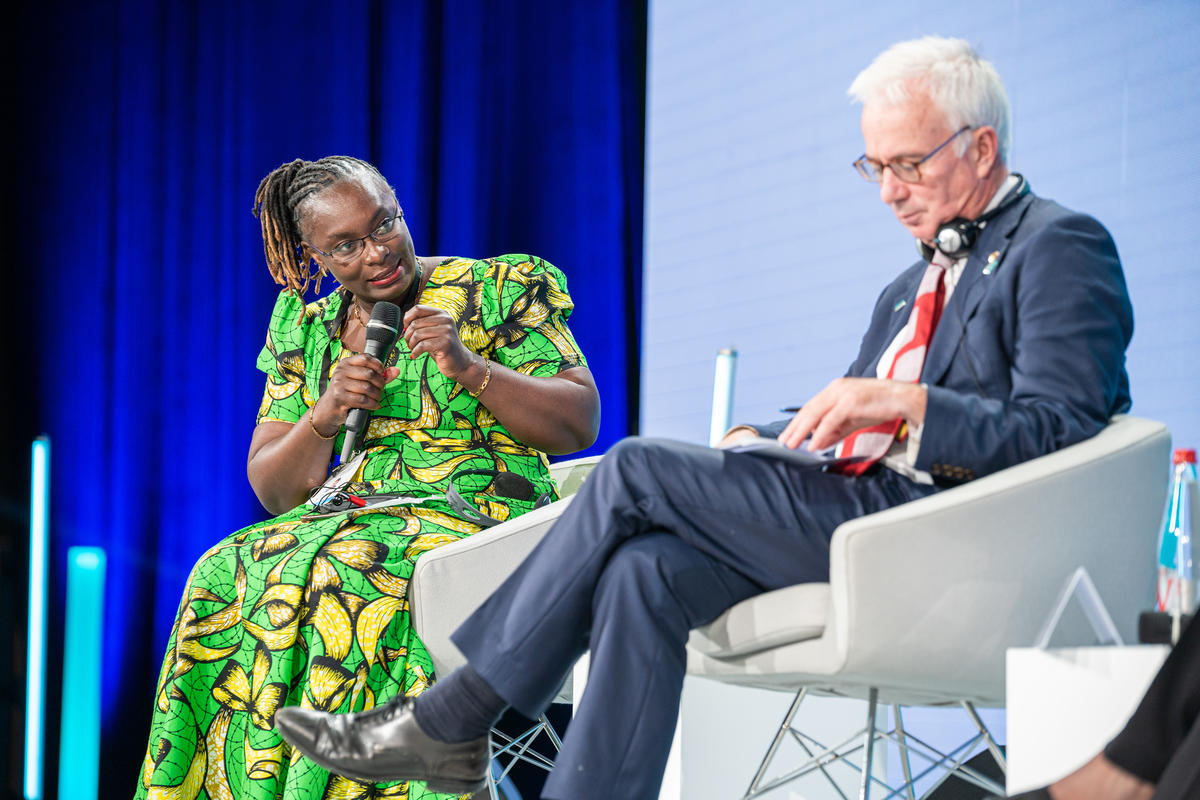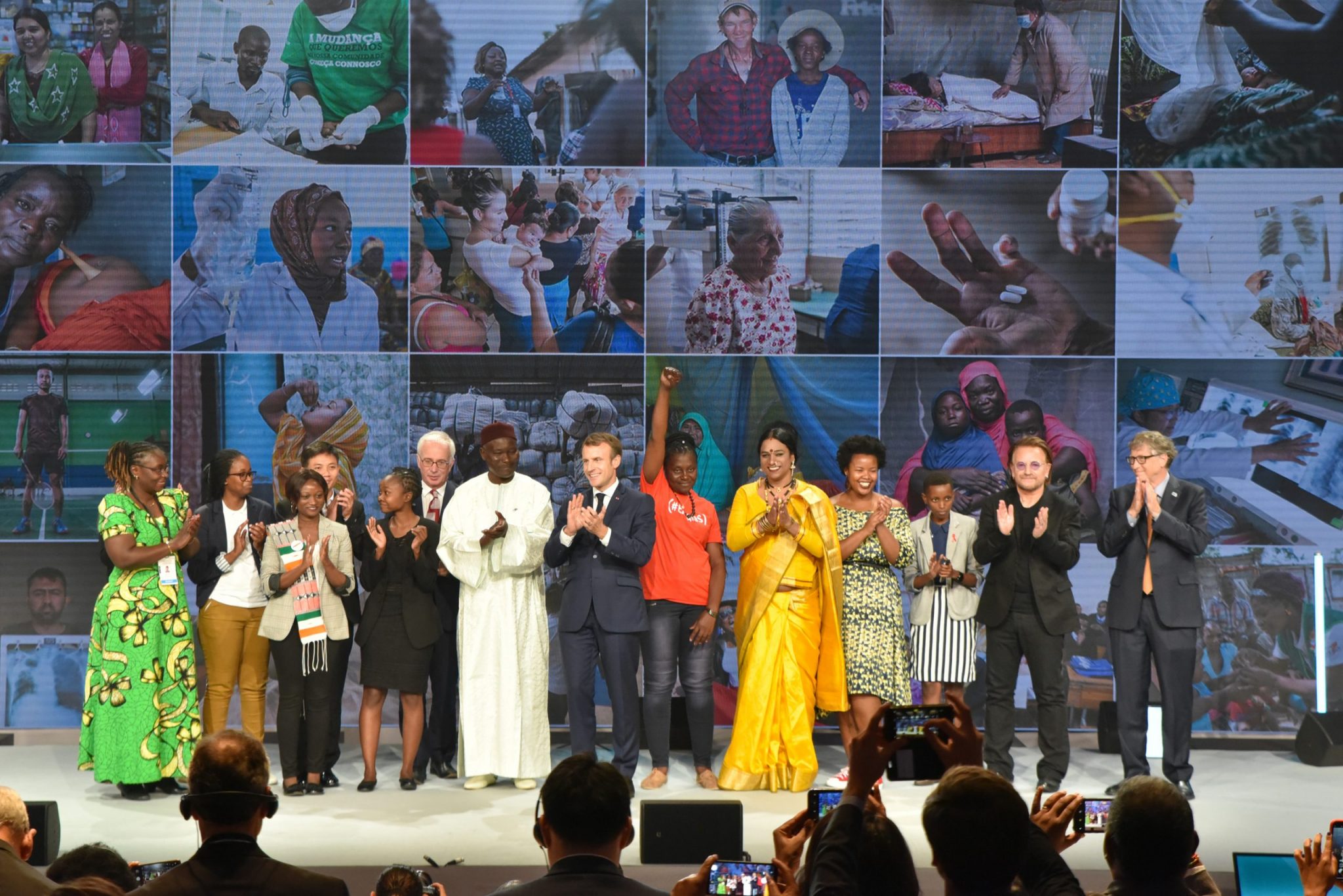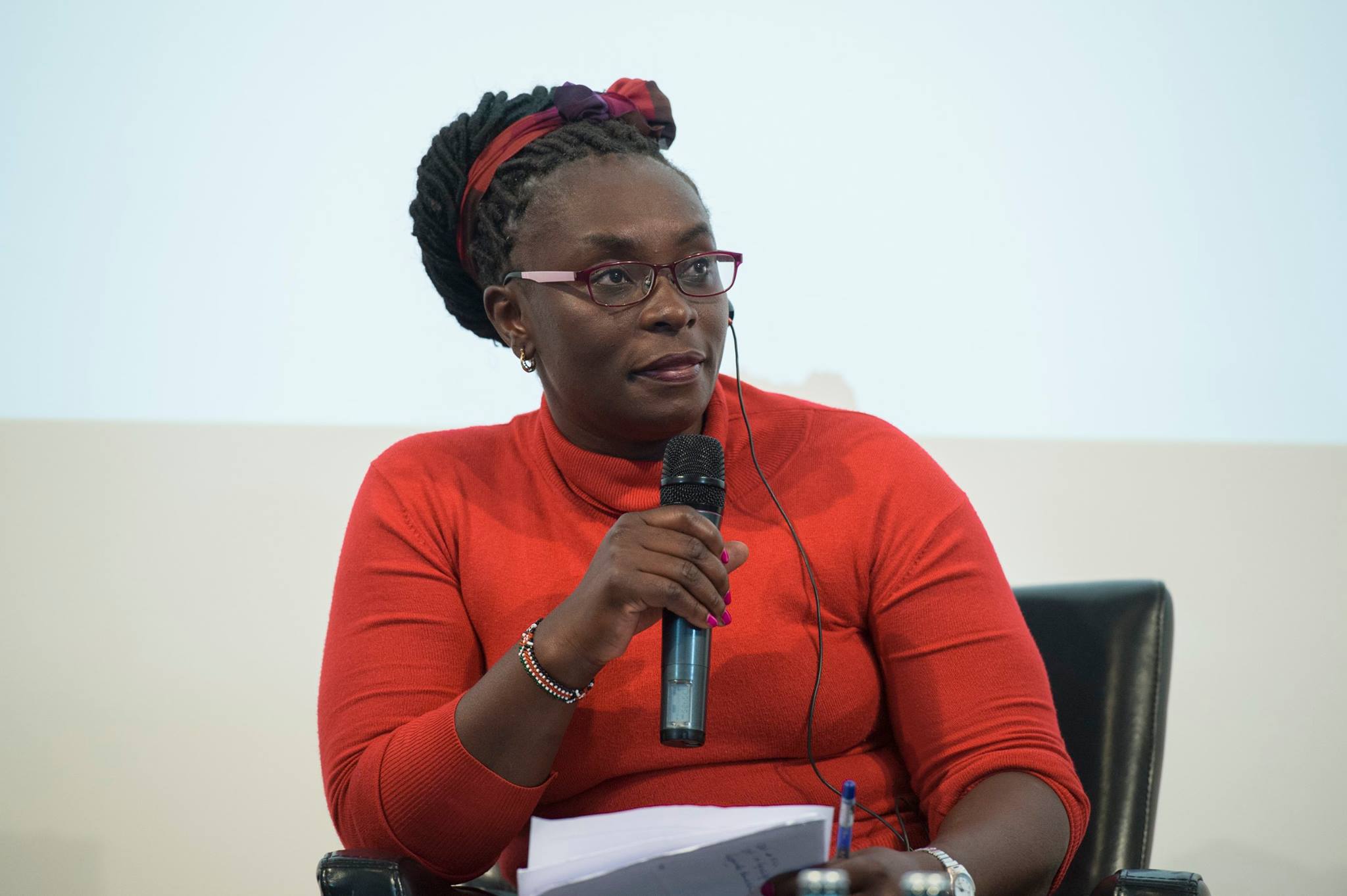 Maurine Murenga speaking as a Panelist at a Global Fund Resource Mobilization Meeting in Germany for the 5th Replenishment.
Maurine Murenga speaking as a Panelist at a Global Fund Resource Mobilization Meeting in Germany for the 5th Replenishment.
In this latest issue of the “Infectious Diseases Without Borders–Our Story” series, Friends of the Global Fund, Japan (FGFJ) and Asahi GLOBE+ are pleased to feature Maurine Murenga, a woman from Kenya who is living with HIV and was able to receive life-saving treatment for her and her son, thanks to the support of the Global Fund to Fight AIDS, Tuberculosis and Malaria (The Global Fund). She later established a foundation to protect the health and human rights of young women and girls suffering from adversity in Kenya and was selected to run in the Tokyo 2020 Olympic torch relay. This is a story of a woman who overcame many hardships and continues to actively advocate on an international platform to have the voices of the affected communities heard throughout the world.
To read this article in Japanese, please visit the Asahi GLOBE+ website.
Diagnosed with HIV
Q: When you first found out you had contracted HIV, how did those around you respond?
I was 22 years old, in a stable relationship, and 4 months pregnant when I found out I had HIV. The doctor told me that persons like me typically had two years to live, but that I would die more quickly because of my pregnancy.
After the diagnosis, the father of my child left. I think he was afraid that people would question his status, and he could not bear the shame and stigma. I also lost my job at a private school in Nairobi. My employer found out that I was living with HIV and fired me on the pretext of poor performance, but it was in fact, because the school was afraid to lose students if the parents found out that there was a person living with HIV at the school. All other good jobs at the time required an HIV test, so I could not get a well-paying job. Only manual labor at a factory.
Q: How did you cope in the early years when no treatment was available?
I was deeply depressed and isolated but carrying a life inside me gave me the impetus to keep going as I wanted to give my baby a chance to live. This baby was all I had, and I constantly worried about dying. If he died first, I could not bear to be alone without him. But if I died first, I could not bear to think he would be an “AIDS orphan.”
Soon after the diagnosis, I met a woman who was organizing a group for women living with HIV that provided community care. Joining the group and listening to other women’s stories gave me strength. I even saw that some looked healthy and started to think that I might be able to stay well for a while, too. I volunteered with other women living with HIV to care for those who were living with full blown AIDS, by sitting with them, bathing them, and providing home-based care during their long, painful deaths.
The Global Fund and getting life-saving treatment
Q: How did you first learn about the Global Fund to Fight AIDS, Tuberculosis and Malaria (The Global Fund)?
Through this same support group. I was 25 years old when I heard about the life-saving effects of anti-retroviral treatment (ARV) and learned how the Global Fund was going to procure medication for those who could not afford it.
Together with other advocates, we wrote to the Global Fund, asking them to send ARVs, but found out that the government had to make the request. We started lobbying the Kenyan government, but the government officials were afraid that news of people in Kenya catching HIV/AIDS would hurt tourism. Nevertheless, we continued to pressure the government, and eventually succeeded in getting ARVs to Kenya with support from the Global Fund. We were finally able to access treatment in 2004.
 Maurine facilitating a Global Fund Implementer Group Meeting in Senegal as the Vice-Chair, 2019.
Maurine facilitating a Global Fund Implementer Group Meeting in Senegal as the Vice-Chair, 2019.
Q: What changes did you see in having the Global Fund extend support to Kenya?
Before the Global Fund, because there was no treatment, if someone has HIV, they would waste away and die. But since the Global Fund came, they changed the narrative. And it has turned us from being dependents. If you didn’t have jobs, you had to be a dependent. Now, people living with HIV are getting employed, having families, living normal, healthy lives; they don’t look sick and bad because of access to treatment. Then, of course, they understand that if someone has an undetectable viral load, they cannot pass the infection. That also reduced the stigma of people living with HIV to a certain extent.
The Global Fund supports in procuring treatment, diagnostics, and commodities such as condoms for prevention. But for the Global Fund, it’s not just about global health financing. It is focused on the person. The Global Fund invests in addressing barriers because it is not only about pills and needles, but barriers to access. I have since had another baby who is HIV-free as I was able to give birth at a Global Fund supported clinic which offered prevention of mother to child transmission.
Helping others
Q: You are now an active advocate in supporting people living with HIV, and you have also created a foundation specifically to help young women and girls. What motivates you?
Through my own experience, I saw the inequalities and vulnerabilities young women and adolescent girls living with HIV experience. I founded the Lean on Me Foundation in 2008 to support adolescent girls’ and young women’s access and adherence to HIV treatment services in Kenya. Lean on Me Foundation started as a support group in my living room with a few young women. Now the organization has grown and expanded to address various barriers that women living with HIV face, including education.
I owe my life to the Global Fund. And it is only natural that I have been actively involved in the Global Fund Board as a member representing the Communities Delegation to voice the opinions of the affected, and also as a member of the Country Coordinating Mechanism of the Global Fund in Kenya, the very organization responsible for making requests to the Global Fund and implementing programs in my country. I also sit on the board of many other international organizations to make sure our voices are heard.
Maurine speaking at the Global Fund’s Sixth Replenishment Conference in Lyon, France. ©The Global Fund/David O’Dwyer 2019
Facing COVID-19
Q: How has COVID-19 affected your life?
Like everybody else, it is so difficult. And for us, leaders of a network of people living with HIV, it is sometimes very draining. Because you get calls from everyone asking for one assistance or another. There is someone who needs help to get her medication but she cannot travel. Another person says she is hungry; some lost their jobs, or don’t have food and cannot take medicine on an empty stomach. So it makes us very drained emotionally because that person remains in your mind but you can only do so much.
Q: Given the obvious challenges and negative effects of COVID-19 that we all face all over the world, are there any positive aspects such as the rising awareness worldwide about the borderless threat of infectious diseases?
I think I see some good changes. COVID-19 is a bad thing but from COVID-19, we learn the importance of strengthening both the health system and the community system. When we had Ebola, we learned the lesson of strengthening community system. But with Ebola, because it was just in a small part of Africa, not many people learned about it. But with COVID-19, it has affected the whole world. Everyone knows about COVID-19; everybody knows what they need to do to prevent COVID-19.
Another good thing I have seen is that we can get daily data. Because for malaria, in 2019, the only data I could get for malaria online in Kenya was from several years ago. But with COVID-19, we can get daily data. And that will help us make very critical decision in addressing health issues across the globe.
We have seen the need for integration because now we are using GeneXpert machines to do some of the COVID-19 diagnostics. That shows that if we integrate our health system, we could have a lot of efficiency because we can use the same resources, the same labs. Our services were so scattered: HIV, tuberculosis (TB), and malaria each has its own lab and system. So, we really have to learn a positive thing out of that and do integration.
Another thing, on the flip side, is that as much as we talk about emergency response within our health system, I think the world was not well prepared for COVID-19. And therefore, we stopped even thinking about AIDS, TB and malaria, and COVID-10 was now like the little baby who gets all the attention. But with epidemics, you cannot stop responding. The lesson that we learned here was that our health system should be able to manage emerging epidemic and not forget the current epidemics.
Message to the Japanese readers
Q: Do you have any messages you would like to convey to the Japanese audience?
I want to thank the Japanese people and the Japanese government for their investment in the Global Fund. It is through that investment that some of us are able to stay alive. I do want to assure them that their investment was not in vain. It has supported us, our families, our friends, and our neighbors to stay alive, to be able to work, to be able to raise families, and live a normal life. So I just wanted to say that we are not taking for granted what Japan and other contributors have been sacrificing to support the Global Fund, and we are hoping that they will continue in the same partnership because we still need global solidarity to fight the three epidemics of HIV, TB, and malaria, plus the additional epidemic of COVID-19.
Supporters of the Global Fund celebrate at the successful conclusion of the Global Fund’s Sixth Replenishment Conference in October 2019.
From left to right: Maurine Murenga, Olya Klymenko, Phumeza Tisile, Zeinabou Idé, Saw Winn Tun, Joyce Amondi Ouma, Peter Sands, Elhadj Diop, President Macron of France, Connie Mudenda, Abhina Aher, Dr. Zolelwa Sifumba, Amanda Dushime, Bono, Bill Gates. ©The Global Fund/David O’Dwyer 2019
Interviewer’s Note
“When she first learned that she was living with HIV, Maurine hid this even from her mother for fear of what her family would say. Eventually, she mustered up the courage to speak out, and is now a leader on the international stage, speaking out about the current situation of those affected. That’s why I was looking forward to her visit to Japan, thinking that it would be a dream come true for her to be chosen as a torchbearer for the Tokyo 2020 Olympic Games, alongside those also fighting infectious diseases, in Okinawa, the place where the Global Fund was first conceptualized. However, due to travel restrictions by the COVID-19 pandemic, she could not come to Japan, and unfortunately, would be cheering on her other team members from Kenya. I can only hope that COVID-19 will end as soon as possible and that the day will come when Maurine and her family will be able to visit Japan so we can hear her story in person.”
– Sachiko Aoki, Japan Center for International Exchange (JCIE) / Friends of the Global Fund, Japan (FGFJ)
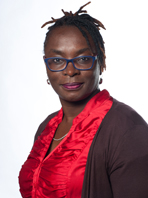
About Maurine Murenga
Maurine Murenga is currently the executive director of the Lean on Me Foundation, a member of the Communities Delegation of the Global Fund, and has an extensive background working on community development. She is also a member of the Communities Delegation of Stop TB Partnership and UNITAID board. Maurine’s passion for advocacy is driven by her lived experience, and the inequality and vulnerability that young women and adolescent girls living with HIV experience in her community. In response to these challenges, she founded the Lean on Me Foundation, an organization that provides comprehensive care and support to adolescent mothers and children living with and affected by HIV and TB in Kenya.
To read more interviews like this one, please visit the main “Infectious Diseases Without Borders—Our Story” series page.
For interview content in Japanese, please visit the Asahi Shimbun GLOBE+ website.

